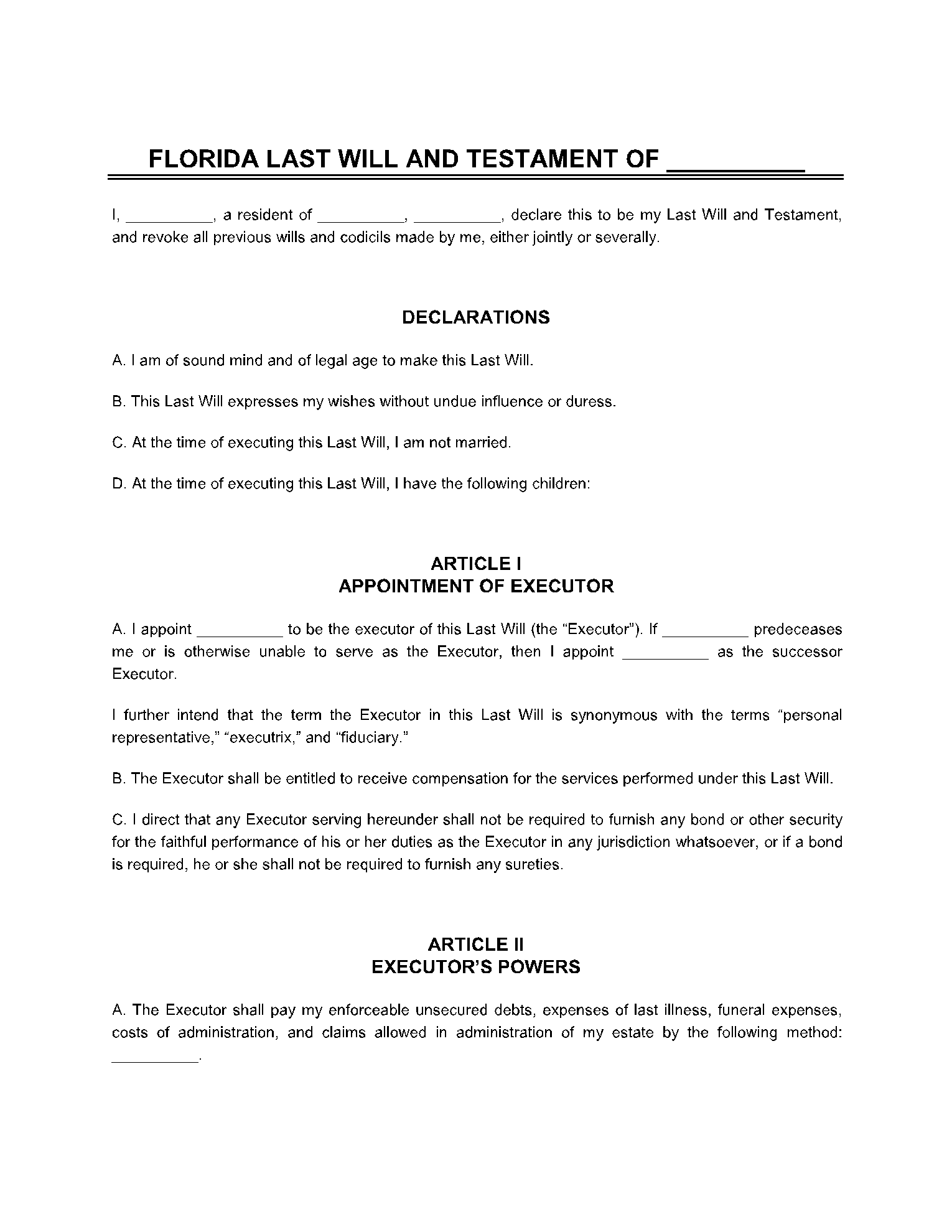A Florida Last Will and Testament is a valuable tool for someone who wishes to have the authority over how their properties are distributed after they die. When writing a will, the testator may provide provisions for inheritance, guardianship of children and pets, charitable contributions, and the distribution of valuables and family heirlooms.
Suppose the person has particular beneficiaries in mind and does not want their property to go to the state, has no living family, or has minor children who would need to be cared for in the event of the testator's death. In that case, the Florida Will is a must.
What Is The Florida Last Will and Testament?
A Last Will and Testament in Florida allow the testator to divide their estate, property, and digital assets among their spouse, children, partners, friends, relatives, and organizations. The testator has the choice of appointing the executor of the estate.
The executor is the person who will be in charge of carrying out the will's terms, whether it's a personal friend or a licensed accountant, or a consultant.
There are some different kinds of wills:
- A Testamentary Will is a legally binding document that must be signed in the presence of witnesses.
- A holographic will is an unwitnessed written will that is rarely upheld in court.
- An Oral Will is a declaration made in front of witnesses.
Why Should You Have a Last Will and Testament in Florida?
A Florida Will form allows you to appoint a personal representative to handle your estate's administration. The personal representative is responsible for gathering assets that pass into the Florida Will, paying creditors, and distributing assets to beneficiaries.
Selecting a guardian for your minor children is another essential function of a Florida Will. This is especially important if neither parent is alive to raise the baby. While the court is not required to follow your appointment, it will do so with great respect.
It would be best if you will make specific bequests of your property in your sample Florida will. Real estate, tangible personal property, and cash are all examples of specific bequests. The residuary inheritance in your Florida Will forms is used to pass any remaining assets to your heirs after debts, administrative costs, funeral expenses, and relevant bequests have been paid.
How Can I File a Florida Last Will and Testament?
Using a Florida will template is less expensive than hiring an attorney to write one. Any of the templates are available for download. Ensure a will template in Florida complies with Florida law and isn't a generic will template that can be used in any state. To file a Florida Last Will and Testament, you need to get an online template or hire a lawyer who will help you in filing it.
The following topics will be covered by the Last Will and Testament template in Florida:
- An executor is a lawyer or accountant who has been chosen to carry out the testator's wishes regarding their assets.
- Mention your assets that you have. A testator's properties may range from real estate, pensions, and bank accounts to automobiles, valuables, artwork, and family heirlooms.
- The details regarding the beneficiaries that will obtain an inheritance after the testator's death must be included in the Testator's Florida will. A beneficiary may be a person or an entity. If the testator's property and belongings are specified in their Florida will form, they may go to their spouses, children, family, close friends, or organizations.
According to Florida law, a will must be filed with the court within ten days of the testator's death. So, when you die, the person appointed as your representative, also known as an "executor" or "administrator," can file your will in your local probate court. This will initiate the legal procedure known as "probate," in which your wishes will be carried out under the supervision of the judge.
Conclusion
According to Florida law, a last will and testament in Florida must be filed with the court within ten days of the testator's death. So, when you die, the person appointed as your representative can file your Florida will in your local probate court. This will initiate the legal procedure known as "probate," in which your wishes will be carried out under the court's supervision.
